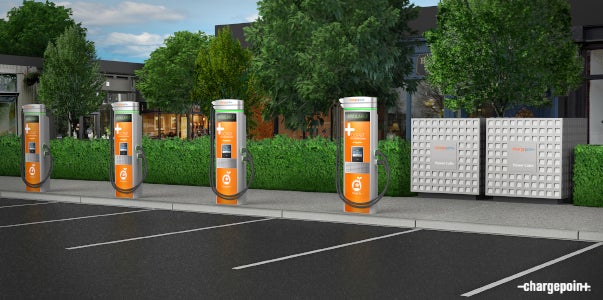
A hundred years ago, speed limits were 10 miles per hour, the population of Las Vegas was under 2,000 people and the small number of drivers on the road had to spend precious time and fuel seeking out the few drugstores around town that sold gasoline. Today, speed limits are unlisted in some places (not that I’d know...), there are more than 2 million people living in Las Vegas and it’s pretty easy to find a gas station anywhere along the freeway.
It took a few decades for the interstate highway system, and the gas stations that go with it, to become widespread. EVs and charging infrastructure are accelerating much faster, with EV sales growing nearly 70% year over year in January 2017 and new charging spots popping up every day (check the counter on our homepage for the latest). But despite the rapid growth in charging, we’ve been missing a truly convenient and future-proof way for long-range EVs to charge up very fast on long trips.
EV Range Is Growing
As EVs gain longer range, faster charging becomes more important. To make EV road trips truly convenient, not just feasible, drivers of long-range EVs need easy access to DC fast charging in strategic locations along major roadways. There are many promising range developments coming in EVs: the affordable Chevy Bolt EV offers 238 miles of range, the Model 3 will bring Tesla’s 200-plus-mile range to the mass market for the first time and Hyundai has promised a 200-mile Ioniq next year. As more BEVs with longer range come on the market, the need for conveniently located fast charging will continue to grow. But as battery technology keeps evolving, fast charging designed with only today’s EVs in mind won’t suffice for long.
Getting Ready for the Future
As an engineer and EV driver, I knew we could make a DC fast charging system that provided as much power as EVs could accept right now and also accommodate faster charging speeds. A vision for fast, easy fueling for all EVs, now and in the future, was our inspiration for building ChargePoint Express Plus, a modular fast charging system that can grow with driver demand and battery capacity. Express Plus is ready to charge every EV at its top speed today, and it will also work with all of the EV battery technologies we expect to emerge over the next 10 years. Big leaps in battery technology, like the 800-volt batteries coming soon in many vehicles, will give EVs longer range while enabling them to charge much faster than ever before. Express Plus will be ready for all of these advances and able to charge all of these next-generation vehicles.
We Have the Power
ChargePoint Express Plus can charge today’s and tomorrow’s EVs more than three times faster than today’s fastest chargers and eight times faster than standard 50 kW fast chargers. Charging at these rates requires a massive amount of power: ChargePoint Express Plus can distribute up to 400 kW to a single EV, enough to add hundreds of miles of range in 15 minutes (we expect EVs in the near future will accept that much power). To provide some perspective, these power levels are typically used by data centers, hotels or convenience stores that require 400 to 500 kW generators. So think of how much energy it takes to power an entire data center, hotel, or store—including heating and cooling, computers, lighting and more—and you’ll start to see just how much power Express Plus can deliver to a single EV, without you even noticing the massive energy management going on behind the scenes.
Widespread availability of affordable EVs with 200+ miles of range marks a key transition point in the road toward everyone being comfortable with EVs as their primary vehicle for every transportation need. As a triathlete, my favorite transition point in a triathlon is from bike to run. It’s the last transition and one where I shed weight in the form of my bike and helmet. I just put on my running shoes and go. I think that EVs are about to go full speed ahead and get within sight of the finish line: a future where everyone can drive electric, to any destination.

